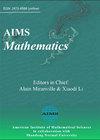Nonlinear robust control of trajectory-following for autonomous ground electric vehicles with active front steering system
IF 1.8
3区 数学
Q1 MATHEMATICS
引用次数: 11
Abstract
This paper presents a nonlinear robust H-infinity control strategy for improving trajectory following performance of autonomous ground electric vehicles (AGEV) with active front steering system. Since vehicle trajectory dynamics inherently influenced by various driving maneuvers and road conditions, the main objective is to deal with the trajectory following control challenges of parametric uncertainties, system nonlinearities, and external disturbance. The AGEV system dynamics and its uncertain vehicle trajectory following system are first modeled and constructed, in which parameter uncertainties related to the physical limits of tire are considered and handled, then the control-oriented vehicle trajectory following augmented system with dynamic error is developed. The resulting nonlinear robust H-infinity state-feedback controller (NHC) of vehicle trajectory-following system is finally designed by H-infinity performance index and nonlinear compensation under AGEV system requirements, and solved utilizing a set of linear matrix inequalities derived from quadratic H-infinity performance and Lyapunov stability. Simulations for double lane change and serpentine scenes are carried out to verify the effectiveness of the proposed controller with a high-fidelity, CarSim®, full-vehicle model. It is found from the results that the proposed NHC provides improved vehicle trajectory following performance compared with the linear quadratic regulator (LQR) controller and robust H-infinity state-feedback controller (RHC).具有主动前转向系统的自主地面电动汽车轨迹跟踪的非线性鲁棒控制
针对具有主动前转向系统的自主地面电动汽车(AGEV)的轨迹跟踪性能,提出了一种非线性鲁棒h∞控制策略。由于车辆轨迹动力学受到各种驾驶动作和道路条件的固有影响,因此主要目标是处理参数不确定性、系统非线性和外部干扰的轨迹跟随控制挑战。首先建立了AGEV系统动力学模型及其不确定车辆轨迹跟踪系统,考虑并处理了与轮胎物理极限有关的参数不确定性,开发了具有动态误差的面向控制的车辆轨迹跟踪增强系统。最后根据AGEV系统要求,采用h -∞性能指标和非线性补偿设计了车辆轨迹跟踪系统的非线性鲁棒h -∞状态反馈控制器(NHC),并利用二次h -∞性能和Lyapunov稳定性导出的一组线性矩阵不等式进行求解。采用高保真CarSim®整车模型对双变道和蛇形场景进行了仿真,验证了所提控制器的有效性。结果表明,与线性二次型调节器(LQR)控制器和鲁棒h -∞状态反馈控制器(RHC)相比,所提出的NHC具有更好的车辆轨迹跟踪性能。
本文章由计算机程序翻译,如有差异,请以英文原文为准。
求助全文
约1分钟内获得全文
求助全文
来源期刊

AIMS Mathematics
Mathematics-General Mathematics
CiteScore
3.40
自引率
13.60%
发文量
769
审稿时长
90 days
期刊介绍:
AIMS Mathematics is an international Open Access journal devoted to publishing peer-reviewed, high quality, original papers in all fields of mathematics. We publish the following article types: original research articles, reviews, editorials, letters, and conference reports.
 求助内容:
求助内容: 应助结果提醒方式:
应助结果提醒方式:


